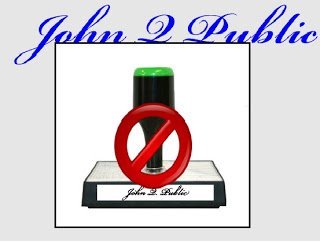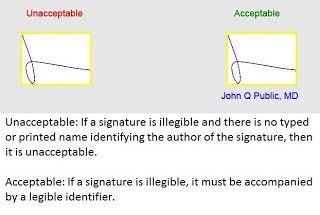Physician signature requirements
Medicare requires that services provided / ordered be authenticated by the author. The signature for each entry must be legible and should include the practitioner’s first and last name. Medicare recommends physician to use their applicable credentials (e.g., P.A., D.O. or M.D.). Stamp signatures are not acceptable.
The purpose of a rendering / treating / ordering practitioner’s signature in patients’ medical records, operative reports, orders, test findings, etc., is to demonstrate that services submitted to Medicare have been accurately and fully documented, reviewed and authenticated. Furthermore, it confirms the provider has certified the medical necessity and reasonableness for the service(s) submitted to the Medicare program for payment consideration.


There are three exceptions to the above requirements:
Exception 1: Facsimiles of original written or electronic signatures are acceptable for the certifications of terminal illness for hospice.
Exception 2: There are some circumstances for which an order does not need to be signed. For example, orders for some clinical diagnostic tests are not required to be signed. The rules in 42 CFR 410 and Pub.100-02 chapter 15, §80.6.1 state that if the order for the clinical diagnostic test is unsigned, there must be medical documentation (e.g., a progress note) by the treating physician that he/she intended the clinical diagnostic test be performed. This documentation showing the intent that the test be performed must be authenticated by the author via a handwritten or electronic signature.
Exception 3: Physician electronic signature policy: Other regulations and the CMS’ instructions regarding conditions of payment related to signatures (such as timeliness standards for particular benefits) take precedence. For medical review purposes, if the relevant regulation, NCD, LCD and CMS manuals are silent on whether the signature needs to be legible or present and the signature is illegible/missing, the reviewer shall follow the guidelines listed below to discern the identity and credentials (e.g., MD, RN, etc.) of the signator. In cases where the relevant regulation, NCD, LCD and CMS manuals have specific signature requirements, those signature requirements take precedence.
Reference: http://www.cms.gov/Regulations-and-Guidance/Guidance/Manuals/downloads/pim83c03.pdf
Also see e-Prescribing (eRx) signature requirements


